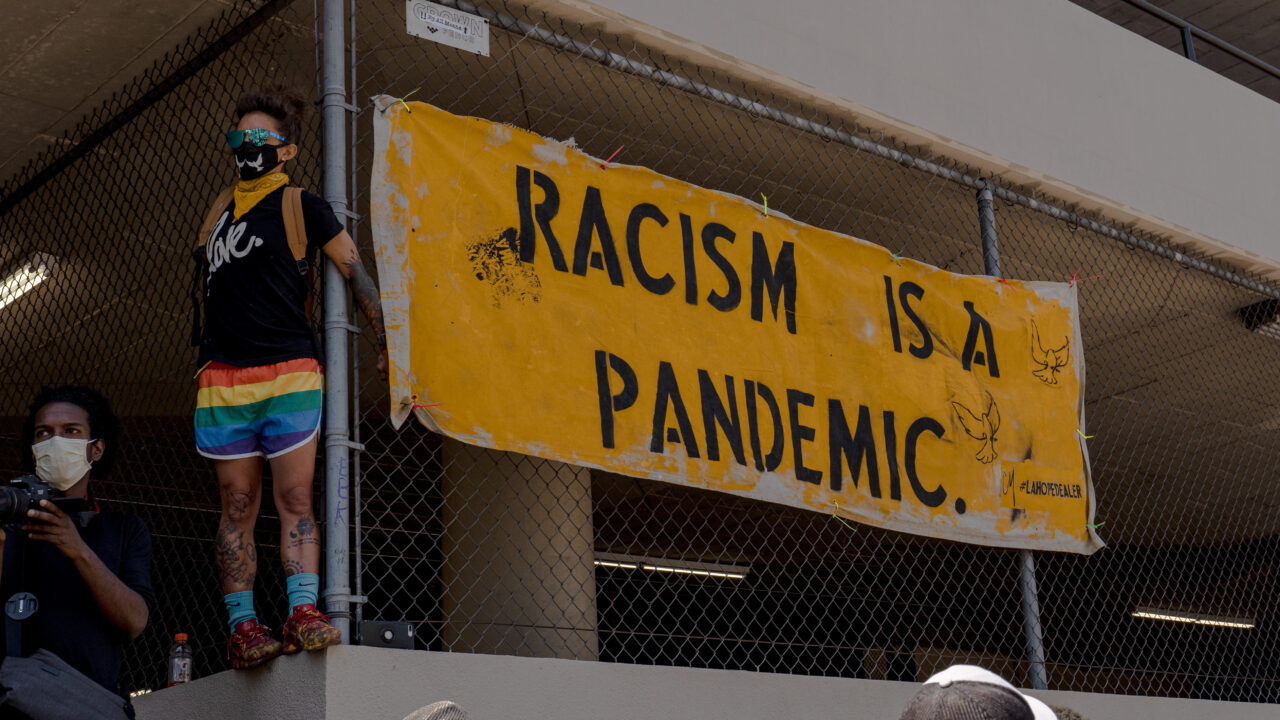Organizers are in a pivotal position to not only call for national economic recovery efforts that center Black people and people of color but also demand systemic transformation that puts us on a path toward economic liberation. From my perspective, which sits outside of day-to-day organizing, there is both great momentum coming off of recent political wins and a need to continue investing in the kind of organizing that stretches our political imagination. Organizing bandwidth and movement alignment can extinguish the vestiges of white supremacy and turn up the heat on demands for the economic liberation of people of color. In fact, organizing is the antidote to a pressing pandemic: racial economic oppression.
The confluence of the COVID-19 pandemic, taped police murders, and an election followed by insurrection has decimated what was left of the tattered veil of racial equality. Black, Latinx, Indigenous, Pacific Islander, and Asian people have always been living an economic nightmare. And by so many measures (COVID-19 cases and deaths, job losses and insecurity, evictions, debt totals), a disproportionate number of Black, Latinx, and Indigenous people are facing the worst of a dual public health and economic crisis — death on the one hand, financial devastation on the other. In 2017, Prosperity Now and the Institute for Policy Studies released a report showing that, by the middle of this century, the median wealth of Black and Latinx people will be zero. Without major economic intervention, the fallout of the pandemic undoubtedly accelerates this timetable and ensures that “recovery” will be slower for people of color.
It is organizers of color who ushered in this new administration. And it is organizers of color who can demand that “building back better” (and other slogan promises) actually means excavating racism from the crevices of our economy. Social distancing — for those who are able — and a vaccine may stamp out the virus’s spread, but these efforts will not end our economic oppression. Distancing racism might. To begin the long work of “distancing racism,” we must pursue economic liberation in ways that eliminate the cycles of oppression. We have to expose the roots of white supremacy, how it replicates and evolves, the bedrock it provides for our broken-by-design economy.
The economic liberation of people of color who survive the pandemic depends on the same organizing power that people of color exacted in key 2020 political wins — and it depends on all of us to support the entrenchment and broadening of that organizing power.
As we identify candidates to run in 2022 and beyond, we must also identify the policies we want them to carry: policies that center recovery and that usher in the economic liberation of Black people and people of color. This demands new monetary and fiscal policy that reigns in corporate power and redistributes wealth. This demands that we have new ways of measuring economic health that accounts for everyone’s physical and financial health, not the health of a few profiteers. A set of basic economic guarantees is what we need: in healthcare, housing, paid family and long-term care, income, employment, education, and generational wealth.
Imagine if the recent wins to increase worker wages and enact protections grew into a federal minimum wage increase and, eventually, a guaranteed basic income and federal jobs guarantee. Imagine if the movement to cancel rent and end evictions ushered in a homes guarantee. Imagine if calls to defund the police transformed the ways we think about public safety and ended the practice of criminalizing poverty in this country. Recent protests against housing people who are experiencing homeless demonstrates that we have a long way to go toward realizing a more equitable future. But this future is possible when we as people of color gather our advocacy, policy analysis, and research strength to support the organizers engaging our communities on a broad, transformative economic agenda.
Fortunately, our political momentum illustrates that investing in relational organizing and leaders of color can deliver political wins. We must continue building and executing that momentum, and we must remain tenacious as we resist, persist, and demand the bold economic agenda that must follow. A COVID-19 vaccine will prevent untold numbers of people from dying, but it won’t do anything to end the racism that drives our economy. In this moment, economic reimagining, not just recovery, is urgent and imperative.

